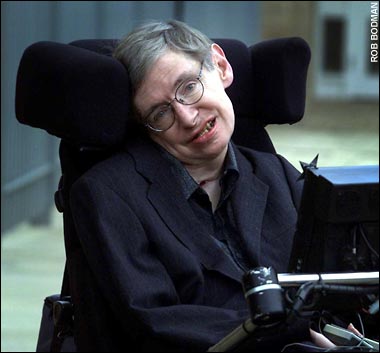Jan 06 2012
Why Stephen Hawking is Cool
 Stephen Hawking, Professor of mathematics and astronomy, Queen Mary, University of London, is turning 70 – a numerical milestone that is unremarkable in itself, but it does provide a reasonable excuse to look back and admire the career of the famous astrophysicist.
Stephen Hawking, Professor of mathematics and astronomy, Queen Mary, University of London, is turning 70 – a numerical milestone that is unremarkable in itself, but it does provide a reasonable excuse to look back and admire the career of the famous astrophysicist.
Hawking is a member of that rare club – the celebrity scientist. Apparently Albert Einstein was the very first member of this club – someone who is not just famous as a scientist among fellow scientists and intellectuals, but a true celebrity and household name. Hawking is one of the few who have truly followed in his footsteps.
It’s interesting to think about how Hawking became as famous as a scientist as he is. Clearly he is a brilliant scientist. His major contribution that initially brought him attention was the hypothesis that black holes emit radiation due to quantum effects (called Hawking radiation). This may seem like an obscure phenomenon, but it was the first to unite quantum effects with general relativity and thermodynamics.
Brilliance is one aspect of his fame, but probably not enough on its own to explain it. The second contributor is possibly his medical illness. Hawking has ALS (which I have written about extensively before). He has an atypical form of motor neuron disease that has apparently stabilized, but not before rendering him mostly paralyzed. His function has declined over the years, but that may be just due to injured motor neurons having a diminished life expectancy rather than a progression of the disease process, but it’s hard to say for sure. He is now confined to a motorized wheelchair and needs to use a computer to communicate.
Hawking has therefore overcome a tremendous disability to have a long life and successful career, and that is admirable. But also it seems to me that Hawking is all the more iconic as a brilliant scientist because of the contrast to his frail body. It’s almost cliche – the massive brain inside the failing small body. The fact that Hawking’s computerized voice sounds robotic adds to the overall image – it would fit well in a cheesy science-fiction movie or comic book.
While his brilliance and disability contribute to his fame, I believe that these two factors alone were not enough. At least the contribution from a third factor is dominant, in my opinion, and that is the fact that Hawking very eloquently popularized science. His book, A Brief History of Time, is a brilliant piece of science popularization and is must reading for anyone interested in science, or just understanding the amazing universe in which we live.
Hawking defies the also cliche but thankfully rarely accurate perception that brilliant scientists are necessarily detached, unable to interface with “normal” people (at least if you believe anything you see on sitcoms). Science is interesting and accessible – all it requires is a willingness for scientists to popularize their work and science in general and the ability to communicate well.
The ability to communicate is a separate skill set, not a general property of intelligence. You can be a brilliant scientist and not be able to lecture or write effectively. It is curious that the skill of communication is not more valued within the halls of science.
I had this conversation with Neil deGrasse Tyson, also an astronomer and brilliant communicator, and he credits Carl Sagan with blazing the trail for science popularizers, at least within astronomy and physics. While the situation is improving I don’t think that Sagan’s example has had as much of an influence on other fields. There is still a bit of a stigma attached to scientists who spend too much time interfacing with the public, and at the very least it doesn’t count for much academically.
This is a shame, and all the more reason that I admire those who have done it successfully, like Hawking.
Stephen Hawking’s coolness is therefore complex, but I think it has mostly to do with his willingness and ability to explain his field of expertise to the world. That is what has made a scientist working in an otherwise obscure field into a celebrity and a treasure.
Also, he has written his books in an incredibly tedious fashion. I broke my left wrist 10 years ago and had to type with one hand for a couple of months. I thought I would go mad (thank goodness it was before my blogging career). Hawking’s dedication to communicating to the public is all the more impressive when you think what he has to go through physically in order to do it.
Stephen Hawking’s 70th birthday in on January 8th, in two days. Happy Birthday, Stephen, and thanks for being so cool.






